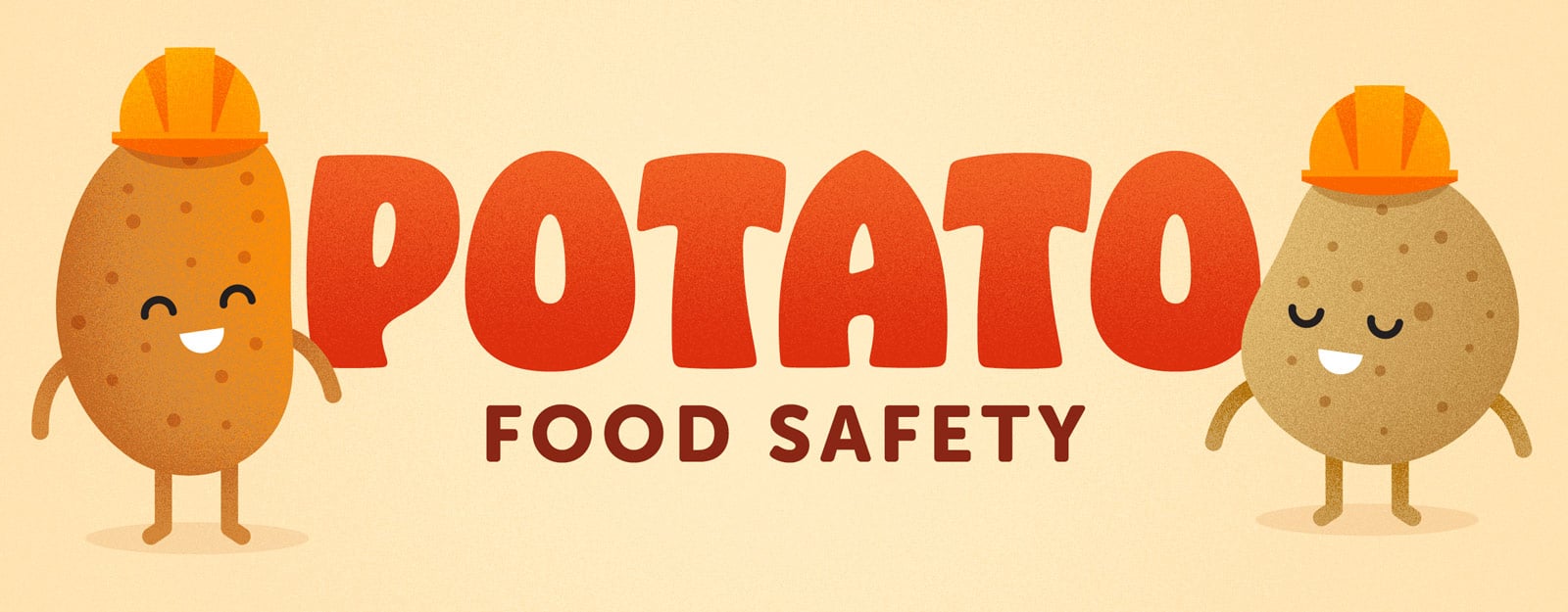
Potatoes are a staple for foodservice establishments ranging from high-end restaurants to caterers to concession stands. Whether you serve fresh-cut french fries, poutine, mashed potatoes, or baked potatoes, you likely keep a stockpile of different types of spuds on hand. However, storing potatoes correctly is crucial to preventing your potatoes from becoming toxic. Use our potato storage tips to ensure food safety at your establishment.
How to Keep Potatoes from Going Bad
Learn how to keep your potatoes from going bad so they're fresh and safe to consume.
How to Store Potatoes
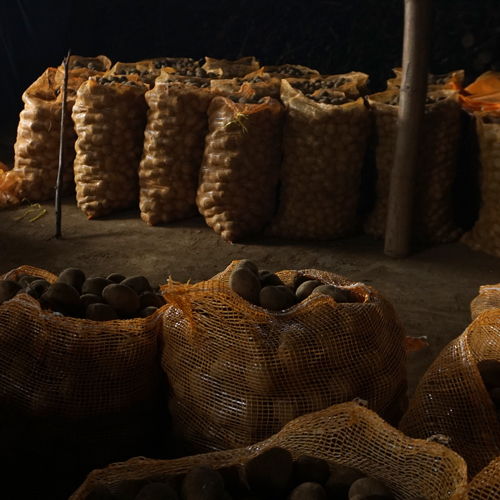
Follow these steps to store potatoes so they don't spoil prematurely.
- Remove the potatoes from the plastic bag and check them for moisture, bruises, or cracks. Use any blemished potatoes first since they will rot quickly and contaminate your other potatoes.
- Dry potatoes, then place them in an open crate, paper bag, or cardboard box. Avoid metal containers since they react with potato enzymes.
- Store potatoes in a cool, dark, ventilated area such as a wine cellar or pantry. Do not store potatoes in the refrigerator since the cold causes the starch to convert to sugar.
- Keep potatoes away from onions, avocados, apples, and bananas. The ethylene gas will cause them to rot.
- Note the storage date and routinely check your spuds for any signs of spoilage. If ignored, your potatoes will rot and release a toxic gas in your cellar or pantry that can be dangerous for staff and patrons.
Best Places to Store Potatoes
Store potatoes in a cool, dark, dry environment to prevent spoilage. The best conditions are around 50 degrees Fahrenheit, which is colder than room temperature and warmer than your refrigerator. Before storing your potatoes, place them in a paper bag, wire basket, or cardboard box, then keep them in one of the following locations.
- A ventilated pantry
- A wine or root cellar
- A drawer away from fruits and vegetables
- A cool, dark countertop
How Long Do Potatoes Last?
Potatoes have a short shelf life, but proper storage conditions allow you to extend their longevity. Whether you have raw or cooked potatoes, you can make them last anywhere from a few days to a few months depending on your technique. Clearly label potatoes before storing them to ensure you know their expiration date.
- Raw stored at room temperature: 1 to 2 weeks
- Raw stored at 50 degrees Fahrenheit: 2 to 3 months
- Cooked, cooled, and refrigerated: 3 to 4 days
- Cooked, cooled, and frozen: 10 to 12 months
How to Freeze Potatoes
Freezing cooked potatoes reduces expenses and food waste, preserving potatoes for up to a year. After you cook them in your preferred method and allow them to cool safely, follow these steps to freeze your potatoes.
- Separate whole or sliced potatoes on a tray without letting them touch, then place the tray into the freezer. If you're freezing mashed potatoes, you can skip this step and immediately portion the potatoes into freezer bags for long-term storage.
- Wait 6 to 12 hours, then check that the potatoes are frozen solid.
- Transfer the frozen potatoes into freezer bags, remove excess air, and label each bag with the date.
- Place the bags into the freezer and use within the next 12 months.
How to Store Baked Potatoes
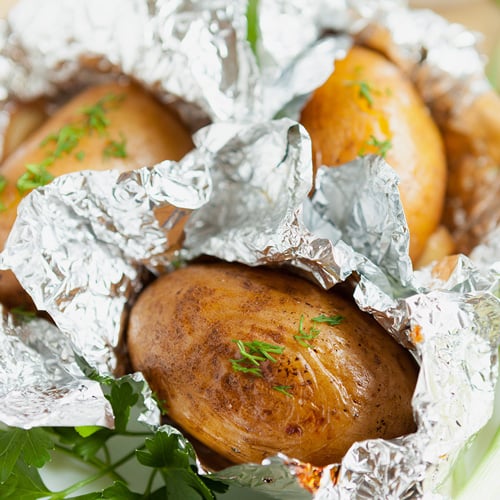
Baked potatoes are a TCS food with specific guidelines to store them safely. All cooked potatoes must be safely cooled using the two-stage method before placing them in the refrigerator.
- Remove all toppings from the baked potatoes.
- Cool potatoes to between 135 and 70 degrees Fahrenheit in two hours or less.
- Cool to between 70 and 41 degrees in 4 hours or less.
- Individually wrap each baked potato in plastic wrap or foil. Other cooked potatoes, such as scalloped potatoes, can be stored in an airtight container without wrapping.
- Place the wrapped potatoes in an airtight container labeled with a date so you can track freshness.
- Reheat and serve within 3 to 5 days.
Do Potatoes Go Bad?
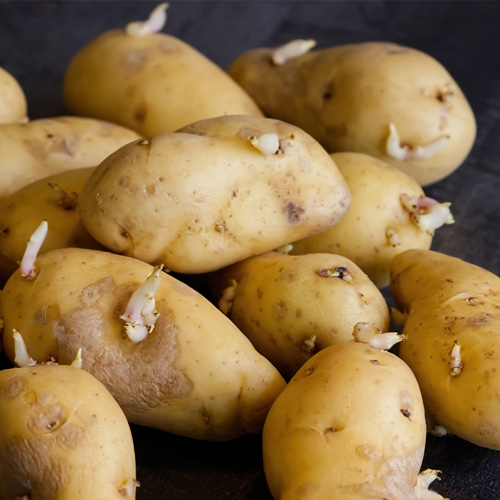
Yes, potatoes go bad, and they tend to be unsubtle about it. Raw potatoes stored at room temperature in ideal conditions last 1 to 2 weeks but can last 2 to 3 months when stored at 50 degrees Fahrenheit. Watch for these signs to know if your potatoes are spoiled.
- Soft or mushy texture
- Wrinkled skin
- Sprouting or eyes
- Sour smell
- Mold or green appearance
Are Sprouted Potatoes Safe to Eat?
You can technically eat potatoes with small sprouts if the potato is firm and unwrinkled, but you must remove the sprouts and any soft areas. Never eat potato sprouts as they contain toxins, and throw out all potatoes with numerous eyes. Overall, we recommend avoiding potatoes with sprouts altogether rather than taking the risk of eating toxic food.
Tips for Keeping Potatoes Fresh
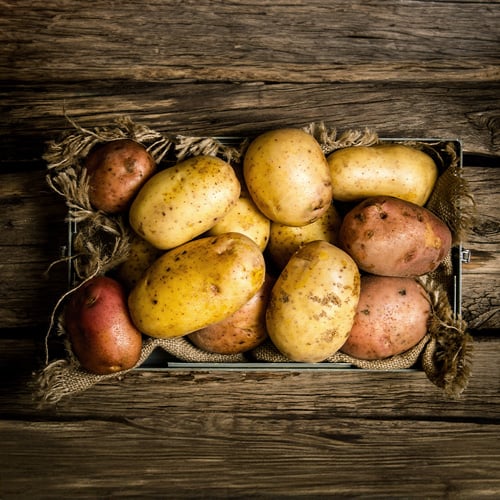
Use these tips to keep potatoes fresh in storage until you're ready to use them.
- Do not peel or wash potatoes before storing them. Leaving a dirt coating on the outside provides extra protection from light.
- If you don't have a dark storage space, put your potatoes in a paper bag to prevent light exposure. Keep the bag unsealed to allow airflow.
- Add a humidifier or dehumidifier to your potato storage space to ensure optimum air quality. 95% relative humidity is ideal for reducing tuber weight loss.
- Add a layer of newspaper between potatoes to thicken the skin, which prevents bruising and rotting.
- If you don't have a good location to store potatoes, try canning them instead. This solution is ideal if you primarily use potatoes for soups, stews, roasts, or sides.
How to Keep Potatoes from Turning Brown
Peeling and pre-slicing potatoes is vital to efficient food prep, but they often turn brown when exposed for too long. You can prevent this issue by submerging your peeled or sliced potatoes in cold water and placing them in the refrigerator until needed. In addition to the water bath, add some lemon juice or vinegar to slow the oxidation process further.
Keep the potatoes in a glass bowl or dish since metal can react with potatoes and cause them to brown more quickly. Your potatoes will last up to one day in these conditions, allowing you to prep them the night before and cook them in the morning.
Ensuring the freshness and durability of stored potatoes is crucial in reducing waste and guaranteeing a continuous supply for cooking purposes. Keep potatoes in a cool, dark, and well-ventilated area, such as a cellar or pantry, to retain their texture and flavor. Regularly inspecting for spoilage or sprouting and employing proper packaging methods will help maintain a strong and long-lasting potato inventory for all your culinary needs.





